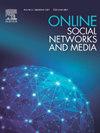Computational analysis of Information Disorder in Cognitive Warfare
IF 2.9
Q1 Social Sciences
引用次数: 0
Abstract
Cognitive Warfare represents the modern evolution of traditional conflict, where the human mind emerges as the primary battleground, and information serves as a weapon to influence people’s thoughts, perceptions, and behaviors. Adopting the Information Disorder perspective, this work meticulously explores the phenomena associated with Cognitive Warfare, particularly as they spread across online social networks and media, to better understand their textual nature. In particular, the work focuses on specific cognitive weapons predominantly used by malicious actors in this context, such as the dissemination of misleading political news, junk science, and conspiracy theories. Therefore, the paper proposes an approach to identify, extract, and assess text-based features able to characterize the forms of Information Disorder involved in Cognitive Warfare. The proposed approach starts with a literature review and ends by assessing the identified and selected features through comprehensive experimentation based on a well-known dataset and conducted through the application of machine learning methods. In particular, by applying the Rough Set Theory and explainable AI it is found that features belonging to readability, psychological, and linguistic categories demonstrate a significant contribution in classifying the aforementioned forms of disorder. The obtained results are highly valuable as they can be leveraged to analyze critical aspects of Information Disorder, such as identifying the intent behind manipulated content and its targeted audience.
认知战中信息混乱的计算分析
认知战代表了传统冲突的现代演变,人类的思想成为主要战场,信息成为影响人们思想、观念和行为的武器。采用信息混乱的视角,这项工作细致地探讨了与认知战相关的现象,特别是当它们在在线社交网络和媒体上传播时,以更好地理解它们的文本本质。特别地,这项工作侧重于在这种情况下恶意行为者主要使用的特定认知武器,例如传播误导性政治新闻、垃圾科学和阴谋论。因此,本文提出了一种方法来识别、提取和评估基于文本的特征,这些特征能够表征认知战中涉及的信息混乱的形式。提出的方法从文献综述开始,通过基于知名数据集的综合实验评估识别和选择的特征,并通过应用机器学习方法进行评估。特别是,通过应用粗糙集理论和可解释的人工智能,发现属于可读性,心理和语言类别的特征在对上述形式的障碍进行分类方面表现出重大贡献。所获得的结果非常有价值,因为它们可以用于分析信息紊乱的关键方面,例如识别被操纵的内容及其目标受众背后的意图。
本文章由计算机程序翻译,如有差异,请以英文原文为准。
求助全文
约1分钟内获得全文
求助全文
来源期刊

Online Social Networks and Media
Social Sciences-Communication
CiteScore
10.60
自引率
0.00%
发文量
32
审稿时长
44 days
 求助内容:
求助内容: 应助结果提醒方式:
应助结果提醒方式:


